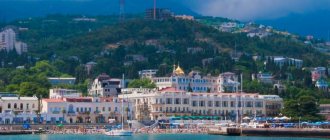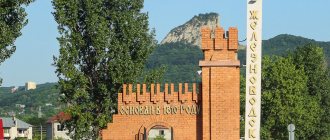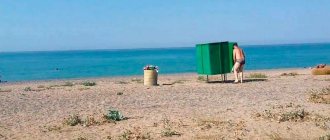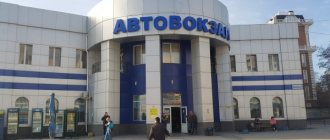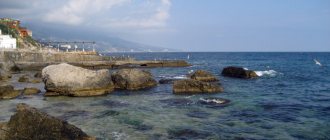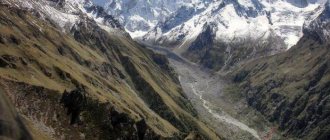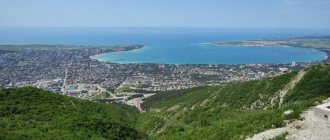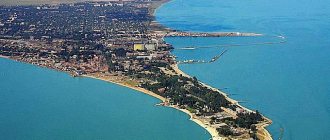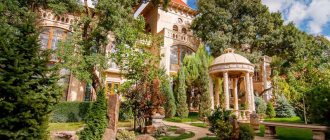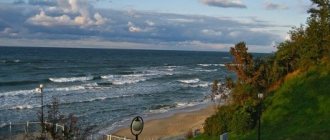The history of the most popular Crimean resort, Yalta, went through almost all the same milestone periods that befell the entire peninsula, especially its Black Sea coast.
The first settlements of the Tauri
, dating back to the 6th-5th centuries BC, were discovered by archaeologists in the city.
But the city of Yalta itself was created by the Greeks
, as local legend says.
The popular Crimean resort of Yalta has a very rich history
General information and brief history of Yalta
Yalta, or as it is also called “Russian Riviera,” is a resort capital in the southern part of Crimea. But the administrative center, called Big Yalta, includes: Alupka, Foros, etc. The length of Greater Yalta is 72 km, and the territory is 900 hectares, half of which is built up, and the rest is planted with trees and exotic shrubs.
Panoramic view of the city
The vast territory of the modern city has been inhabited since ancient times, but intensive development began in the 9th-6th centuries BC. Yalta was first mentioned in writings, then it was called Jalita, in the 12th century. The famous Arab traveler Adu Abdallah Muhammad al-Idrisi mentioned it in his writings.
This city has seen many conquerors; it was in the possession of the Golden Horde, Genoa, the Ottoman Empire, the USSR, and Ukraine. Today it is part of the Russian Federation. Only in 1838, along with the formation of the district, Yalta received city status. And after 5 years, a development plan was agreed upon and the coat of arms was approved.
Old Yalta
The rapid development of the city began with the construction of a port and highways with Simferopol and Sevastopol. From the beginning of the 60s of the 19th century, Yalta and its surroundings began to develop as resorts. At the same time, the imperial family acquired the Livadia estate here, subsequently the favorite vacation spot of all the Romanovs. Thus, Yalta became a fashionable aristocratic resort.
The turning point and impetus for the rapid development of the resort area was the decree of the Council of People's Commissars of the RSFSR “On the use of Crimea for the treatment of workers.” At the same time, sanatoriums, the Artek children's camp, etc. were opened. Pioneers, proletariat and cultural figures come to Yalta from all over the USSR.
Panorama of the night city
Climate and ecology of Yalta
The climate in Yalta resembles a subtropical Mediterranean, acclimatization is very quick and easy.
Winters here are very warm for Russia, mild (average temperature +4-5°C). It's cool in spring, very hot in summer. But autumn in Yalta is warm and long. The sun shines about 2300 hours a year. By the way, Nice, Cannes and San Remo have the same indicators.
Not the least role is played here by the combination of the ice-free sea with the Crimean Mountains, which reliably protect the city and its surroundings from cold winds in winter, dry heat and winds of the Tauride steppes in summer. From the south, the city is completely washed by the sea.
The swimming season in Yalta is very long, it opens at the end of May and lasts 149 days, until mid-October. The average water temperature is around 20°C.
But from an environmental point of view, the situation in Yalta is quite tense. The city has a heavy traffic load, and therefore the concentration of carbon monoxide exceeds the norm by 5-7 times. This is a clear sign of low quality fuel used. And the average concentration of benzopyrene is almost 2 times higher than the norm.
Sewage treatment plants and the water supply network are in extremely dilapidated condition, which contributes to the pollution of water adjacent to popular beaches. There are also problems with garbage collection; concerned citizens often organize cleanup days and clean their city themselves. This situation allows Yalta to be included in the list of cities with an unfavorable environmental situation.
Which accommodation to choose?
The private sector, guest houses, hotels, hotels - they are all waiting for their guests. What to choose is up to the tourist to decide based on his financial capabilities.
Top hotels
- The Yalta-Intourist Hotel has been known since Soviet times, maintains its reputation, and is rated 4 stars. It offers luxurious rooms in the true sense of the word, all-inclusive meals, the best beach in the city, awarded the Blue Flag, a water park, its own zoo and aquarium, entertainment for kids with animators, and has newly built buildings. Standard room for two with a large bed from RUB 8,000. per day.
- The Mria Resort SPA hotel is rated 5 stars, is located directly on its beach, offers luxurious rooms in buildings similar to a plane tree leaf, restaurants, a night club, a SPA center, a swimming pool, and entertainment for children. Rooms from 13,000 rub. per day.
- Hotel "Bristol" is rated 3 stars, located in the historical center of Yalta, five minutes from Massandra beach, offering spacious rooms, a restaurant and cafe on site, a health complex with a warm pool, sauna and fitness, entertainment and interactive events. Rooms from 5500 rub. per day.
You may be interested: Interesting places in Russia
Population
In terms of population, Yalta ranks honorably third among all cities on the peninsula. About 90 thousand people permanently live in Yalta itself. Moreover, every holiday season this figure increases by 300,000 - 500,000 people due to city guests and tourists.
As for the gender and age group of the population, 45% are men, and 55% are representatives of the fair sex. It is noteworthy that in recent years the percentage of the population that is younger and older than working age has increased sharply. But the percentage of the working-age population is constantly decreasing.
If we talk about the demographic situation as a whole, it has almost the lowest indicators in Crimea. The average birth rate is 9.3 per 1000 people. The mortality rate exceeds these indicators by 2 times.
Residents of Yalta on May Day
Recently, the percentage of marriages has increased and divorce cases have decreased. It is interesting that Yalta residents get divorced least of all in the cities of Crimea.
If we talk about the education of city residents, there is no clear answer. There are not many higher educational institutions in the city, in particular only three: the Crimean Humanitarian University, the Institute of Economics and Management, and the European University. Mostly a variety of colleges and schools predominate. In general, education and its accessibility are at an average level.
The people here are friendly, friendly, accustomed to numerous tourists. They will tell you how to get there and how to get there. True, the traders at the markets are a little rude.
Districts and real estate of Yalta
Conventionally, Yalta is divided into 3 main areas: the old city, where Yalta began, the new city and Chekhovo. The city also includes the town. Nikita and Livadia.
Old city
Or, Old Yalta, as this area is also called, originates from the street. Boulevard and stretches up to the east. This area is notable for its large concentration of various buildings from past centuries. Precisely the past, because since the end of the 20th century, practically nothing has been built in old Yalta, since there is no room for it. This area is characterized by narrow winding streets and a large number of houses built close to each other.
Old district of Yalta
Old Yalta is an administrative district; the mayor's office, police, hospitals, city administrative bodies, etc. are located here. The buildings are dominated by 2- and 3-story houses from the times of Imperial Russia in the classicism and baroque style, with their characteristic stucco molding and luxurious decoration. Of course, many of these houses have been restored, but the outskirts of the area are dominated by shabby, graffiti-covered shacks, which cannot be called anything else.
Residential building on the street. Kirov
Most of the premises in the houses in this area are rented for shops, offices, banks, restaurants and other organizations providing all kinds of services, and the area itself is perfect for young, motivated people, but not for families with small children.
If during the day diligence and efficiency reign in old Yalta, then at night the area turns into an entertainment center with countless restaurants, concert venues, clubs and summer cafes. This area also includes, perhaps, the most favorite vacation spot for both local residents and visiting guests - the Yalta Embankment. In any weather, at any time of the day, it is always crowded here.
Embankment named after Lenin
It is impossible not to note the greenery of this area. A variety of tropical plants, trees and shrubs are abundant here. Without a doubt, the central part of the old town is very well landscaped. On the outskirts, you need to get used to pictures that are strange for a tourist center. For example, to shabby, half-shabby buildings or to laundry hung right on the street.
If we talk about the provision of kindergartens and schools, then there are small problems with this. But the number and variety of sites, on the contrary, has good indicators.
Children's playground in old Yalta
The average cost of an apartment near the Embankment is $120,000 – $150,000.
New Yalta
New Town is a fashionable residential area in the north-west of the city, consisting of several microdistricts with serial numbers.
New Yalta
New Yalta is distinguished by its intricate buildings and modern, fully equipped residential complexes.
LCD Darsan Palace
Multi-storey buildings, numerous hotels, a large number of landscaped courtyards and playgrounds. The area is picturesque and well landscaped.
Playground
There are many shops, supermarkets, pharmacies and organizations providing various services to the population. Everything is within walking distance. Quiet, calm and measured environment. The average cost for a one-bedroom apartment in this area is $60,000 – $70,000.
Chekhovo
An abolished village included within the city limits. It is located in the west of the city in the area of the house-museum of A.P. Chekhov, hence the name. Luxurious cottages, painted villas and houses predominate.
Chekhovo
The area is completely landscaped, there are shops and pharmacies. Cons: the nearest hospital is quite far away, there are no large shopping centers.
Smt. Nikita
Nikita is an urban village 7 km from Yalta. Here is the famous Nikitinsky Botanical Garden and many other parks and squares.
Alley in Nikitinsky Garden
Predominantly a cottage village, it has recently been gaining the status of a tourist center in Yalta for family holidays.
Smt. Nikita
It has the cleanest sea. True, the bulk of residential buildings are located at a considerable distance from it. There are many hotels and guest houses here.
Another view of the village
A quiet, peaceful place, ideal for living with family and children. Cons: the sea is far away, there are not enough clothing stores and pharmacies. The average cost of a private home hovers around $1,000,000.
On the other side of Yalta is the village of Livadia with the imperial estate. "Livadia Palace" - the residence of the Romanov family - is the main attraction of this place. It has its own school, kindergarten, and boarding school. Many hotels, shops, restaurants and bars. Recently, the development of this village with multi-storey residential complexes has been actively carried out.
Livadia
Livadia
The village is fully equipped with children's playgrounds, including new ones.
Children's playground in Livadia
Cons: no large supermarkets or shopping centers, insufficiently equipped hospital.
Buses and minibuses constantly run between the village and Yalta. The average cost of a one-room apartment in a new building is $80,000-$100,000, and prices for private homes range from $500,000 to $5,000,000.
Yalta beaches
The beaches in Yalta are absolutely all pebble, quite narrow, the entrance to the sea is steep, a few meters from the shore it hides even a tall person’s head.
After the Great Patriotic War, the beaches underwent a general reconstruction. Sea waves engulfed the shore and washed away the pebbles. The bottom of the bay was strengthened with concrete, a huge amount of new pebbles was brought in, breakwaters were built from the shore into the sea, and the embankment was separated from the beaches by a concrete wall. After that, their improvement was practically not done.
The beaches are gradually being put in order: some of them have been awarded a blue flag. Their main disadvantage is that there are not enough beaches. After the return of Crimea to Russia, the number of vacationers in the main resort city increased 3 times.
Golden Beach
It received its name much earlier than the beginning of resort life. Small sea pebbles are an excellent building material. Its development was carried out right on the seashore and enriched the miners.
Now the beach is clean, there are relatively few vacationers, umbrellas, sun loungers, showers and changing cabins are working. There is a club-style restaurant on the beach, open both day and night.
Massandra beach
He has earned the Blue Flag (an international award) and fully lives up to it. In addition to the usual attributes of the beach, there are reed bungalows for relaxation. There is animation, rental of water equipment, bar and restaurant are open from morning until late evening. Naturally, entrance and entertainment are paid.
Livadia beach
Very clean and cozy, equipped for a comfortable stay, but to get down or up to it, you will have to use the elevator for 50 rubles. every time.
Nikitsky beach
To get there you have to take a bus, but there is no crowd. True, the equipment offered is from the Soviet period. The cafe on the beach serves fast food.
Beach of the Yalta-Intourist Hotel
Received the “blue flag”, the holiday meets international standards. Hotel guests use it for free, others pay for it. Visitors can enjoy massage, fitness, attractions on the shore and in the water, and a mini-water park for children.
The rest of the beaches belong to hotels and sanatoriums, so entry is paid subject to availability.
Infrastructure condition
The housing and communal complex of Yalta is developed quite well. There are many private organizations in the city that service homes. Despite the competition, we won’t have to wait long for price increases for housing and communal services tariffs. The amounts in receipts are growing, but practically nothing is being done for the benefit of homes and yards.
Nizhneslobodskaya st., 2
Homes are constantly covered in graffiti by street hooligans, but no one is in a hurry to erase this modern painting. The entrances are cleaned well, as is the area around the house. But this is not done as often as the situation requires.
Fortunately, with the arrangement and maintenance of highways and roads in Yalta, everything is more or less tolerable. At least you can’t say that the roads in the yards are bad or look like a sieve of bumps and potholes. All potholes are filled promptly and promptly, and the road surface is leveled.
Road along the street Sverdlova
If we talk about traffic jams and congestion on the roads, then if they happen here, then in the summer - at the peak of tourist activity.
As for the transport infrastructure of Yalta, it fully serves the needs of the resort. The main land arteries are the highways: Simferopol - Alushta - Yalta and Sevastopol - Yalta - Feodosia. The city has a seaport, which has several directions: passenger, trade and cargo.
The main types of urban transport are buses and minibuses. The variety and remoteness of routes, as well as a large number of buses on the line, satisfy all the needs of citizens and guests of the city. Not long ago, the city’s fleet was replenished with new buses from post-Olympic Sochi with the symbols of the 2014 Olympics.
Yalta car park
Despite the developed transport infrastructure, there are a lot of private taxi organizations operating in the city, which are also in demand among the population. The average price for one km of travel is just under half a dollar.
If we talk about the problems of the city, the most important of them can be called drinking water, or rather its shortage. Drinking water came to the city from the Ukrainian Dnieper through the North Crimean Canal. In light of recent events, this water simply disappeared. Until 2021, the city will live off reserve storage facilities and artesian sources. By 2021, it is planned to complete large-scale construction of a water pipeline, which will provide water to the entire Crimea, including Yalta.
Enterprises and work in the city
Yalta's industry revolves around 17 main enterprises. Basically, these are the light and food industries, the construction sector and the electric power industry.
The number of employed people in industry is 3.5 thousand people, which corresponds to 22.8% of those employed in the production sector and 5.8% of total employment in the economic complex. Of course, the main industry is the food industry, whose enterprises employ more than 50% of all workers in the industry.
The main enterprises of the industry: Golovnoy, Yalta bakery, meat plant, beer and soft drink.
The main building of the Massandra winery
In the future, the food industry will remain the leading industry in Yalta.
The electric power industry is represented by such enterprises as Krymteplokommunenergo, Yaltakurortteploenergo and Heat Networks. The industry employs 33.5% of those employed in industry.
The construction materials industry in Yalta is represented by the department of production and technological equipment of the Krymspetsgidroremstroy trust, Yalta, etc. The number of employees in the industry is 11.2%.
More than 2,000 facilities of all forms of ownership provide services to the population and guests in Yalta, including:
- More than 600 stores with an area of over 36 thousand m2
- More than 500 catering establishments with 23.6 thousand seats
- 150 kiosks, pavilions
- 130 consumer service enterprises
- 12 markets with 3000 trading places
- 114 seasonal catering establishments with 4,500 seats
- 530 off-site retail outlets
Street trading
However, the bulk of the city’s working population works at resort enterprises year-round in all areas of economic activity. The number of people employed in economic sectors in 2013 fell by 5% and amounted to 55 thousand people. This indicates an outflow of labor resources to other areas of economic activity. For example, the number of entrepreneurs and individuals has increased.
This year, as in previous years, a typical reason for dismissal is low wages, delay in payment of up to 3 months, and inconsistency of the employee’s qualifications with the employer’s requirements. In the first half of 2013, compared to the same period in 2012, the number of registered unemployed decreased - 1.5 thousand people, which is 60% of the registered unemployed population.
Do not forget that Yalta has its own specifics as a resort and recreational complex that carries out seasonal activities, which affects the structure of the economy and the work of enterprises, organizations and institutions and other spheres of life of the population. The average number of full-time employees in all resort and tourism organizations is about 20 thousand people. Between May and September the number of employees increases to 25 thousand people. As a rule, this contingent consists of pupils, students, and retirees hired for temporary work who previously worked at these enterprises.
It is worth noting that the average salary in Yalta does not exceed $250.
General information
The city of Yalta is the administrative center of the urban district, which is called Greater Yalta. It consists of 32 settlements:
- 2 cities - Yalta, Alupka. - 21 urban-type settlements - Beregovoe, Vinogradnoye, Voskhod, Gaspra, Blue Bay, Gurzuf, Katsiveli, Koreiz, Krasnokamenka, Kurpaty, Livadia, Massandra, Nikita, Oreanda, Otradnoye, Parkovoye, Ponizovka, Sanatornoye, Simeiz, Sovetskoye, Foros. — 8 villages — Vysokogornoye, Gornoye, Danilovka, Kuibyshevo, Lineinoye, Oliva, Otradnoye, Partizanskoye. — 1 village — Opolznevoye.
Descriptions of almost all settlements are on our portal; on this page there is a description of the city of Yalta.
The city covers an area of 18 square kilometers. The permanent resident population is approximately 80,000 people; during the holiday season from May to October it increases to 500,000. The main nationalities are Russians, Ukrainians, Crimean Tatars, Belarusians, Jews, etc. Geographic coordinates 44°29′58″ N. w. 34°09′19″ E. d. City Day - the second Saturday of August. City telephone code: +7 3654. Telephone of the Yalta city administration (the “Current Call” telephone line is open from 09-00 to 16-00). Telephone number of the Department of Resorts and Tourism in the Yalta Administration: +7 (3654) 31-06-20. Administration email Distances from Yalta to cities: - Alupka - 21 km, - Alushta - 35 km, - Simferopol (via Alushta) - 81 km, - Bakhchisarai - 84 km, - Sevastopol - 85 km, - Sudak - 120 km, - Evpatoria - 160 km, - Feodosia (via Simferopol) - 170 km, - Kerch (via Simferopol) - 290 km, - Krasnodar - 530 km, - Rostov-on-Don - 770 km, - Moscow - 1900 km, - St. Petersburg - 2600 km, - Novosibirsk - 4500 km, - Khabarovsk - 9600km.
Crime
The criminal situation in Yalta has generally stabilized. Since the entire leadership and majority of the internal composition of law enforcement agencies changed in 2010, the percentage of crimes solved has begun to increase. If we talk about specific statistical figures, then in 2013 serious and especially serious offenses decreased by 5.5%.
In recent years, scammers have become more active in Yalta. They mainly trade through SMS messages or go to the apartments of old people, posing as employees of social services and banks. Also, the percentage of crimes committed by teenagers and young people has recently increased.
It is worth noting that Yalta leads in the number of “land” crimes. This is understandable, because this is a resort. In the last 6 months alone, more than 200 illegal decisions of government authorities on the disposal of land plots have been canceled. And this is only what was verified during the prosecutor's audit. The real numbers are unlikely to ever emerge.
Among the most “loud” and resonant crimes committed in Yalta, several can be highlighted. This murder of a newborn on the Ai Petri plateau shocked all the residents of Yalta... And after 5 months, the residents of the city were stunned by law enforcement agencies, who proved that the child was killed by his own mother. And also dozens of murders committed by a criminal group of “black realtors” who operated in Yalta, forced apartments to be transferred to themselves, and then brutally killed their victims. Last year, all members of the gang were detained, the coordinator was sentenced to capital punishment in the form of life imprisonment
Conclusion.
To summarize, I can say that Yalta is an amazing city. Yalta is good for its climate and nature, as well as its warm and gentle sea. For those who like to “hang out,” there are a lot of entertainment venues here, there is even a boat that goes out to sea at night and hosts a disco on it on the open sea.
If you have never been to Yalta before, be sure to visit it. There are a lot of interesting places that are worth seeing, especially the wonderful nature here, it will not leave you indifferent.
In this article I tried to tell as much as possible about Yalta what I learned after living in the city, perhaps I missed something. If you have anything to add to the article, leave comments. I will write about our travels around Yalta and its surroundings in the following articles, I hope that you will find it interesting and useful. Therefore, subscribe to blog updates and be the first to receive new articles!!!
